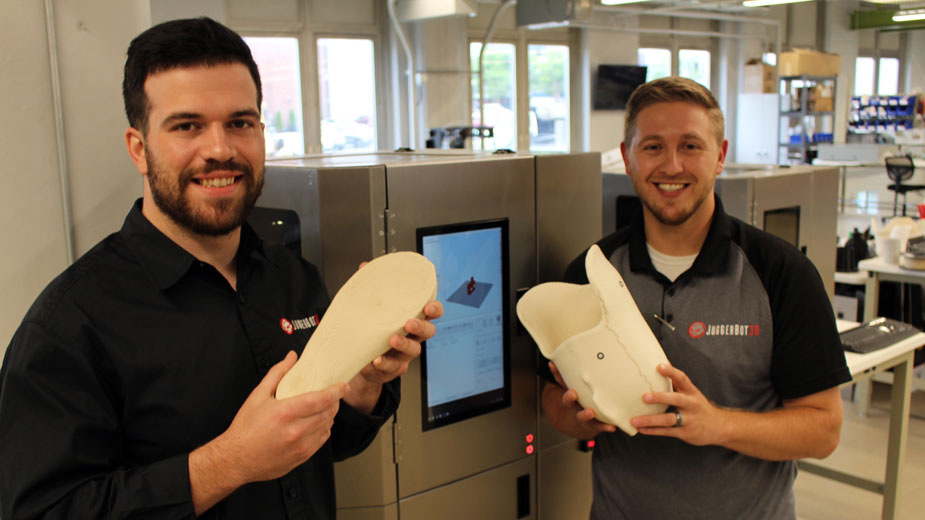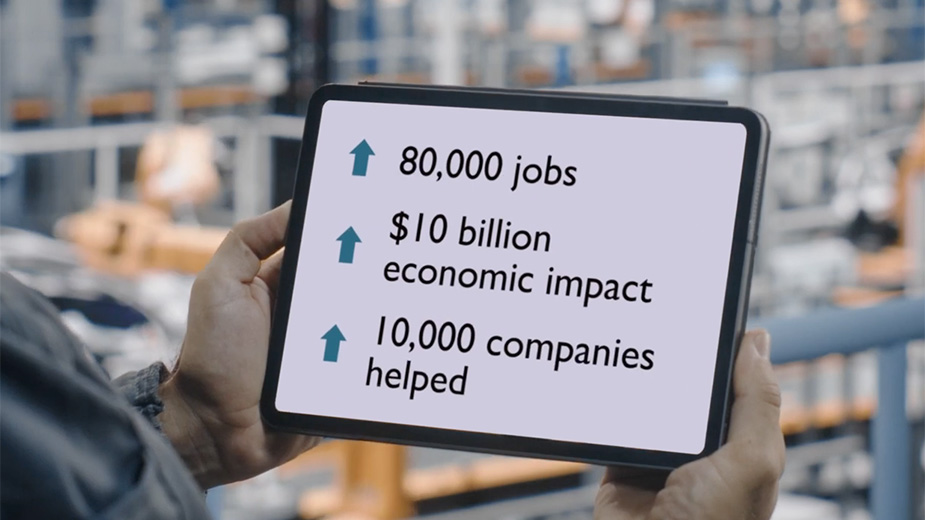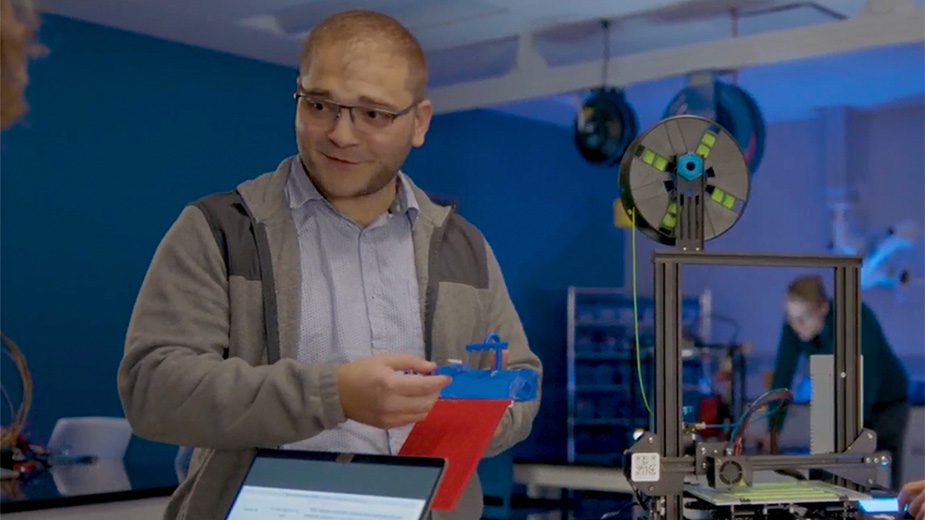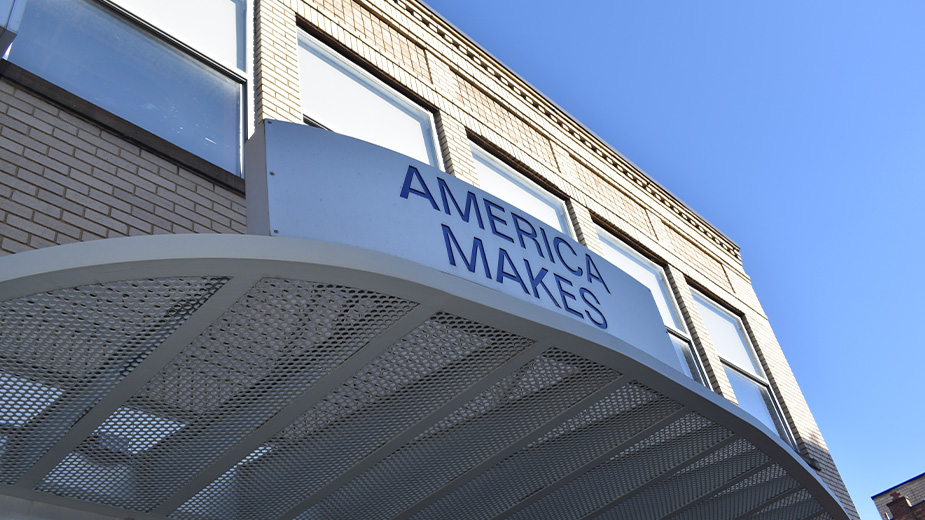Juggerbot 3D Expands to Meet New Markets
YOUNGSTOWN, Ohio – Juggerbot 3D just got a little bigger and so did its products.
The company, which designs and manufactures 3D printers, recently doubled its space in YBI’s Tech Block 5 building in order to accommodate new orders for larger additive manufacturing machines.
“We just expanded to just over 3,000 square feet,” said Zac DiVencenzo, co-founder and chief operating officer. “We needed the square footage to bring on additional people and the manufacturing of our newest pellet-extrusion 3D printer.”
Juggerbot plans to manufacture medium-size 3D printers that can manufacture components or products measuring up to three feet wide, four feet deep and four feet in height, DiVencenzo said.
“We’ll be doing all the assembly in-house. Shipping [and] quality testing is going to be done in here, so we need the space,” he said. The machines stand eight feet high and six feet in length.
The company built one of the larger machines last year and shipped it to Quaker City Castings in Salem, DiVencenzo said. Now, the company has secured additional orders for the larger printers, making it necessary to expand its footprint.
“We started in a 300-square-foot office,” he said, housed at the YBI’s Federal Street building. However, once space in the Tech Block 5 building became available, Juggerbot jumped at the opportunity and secured 1,500 square feet there. The expansion adds another 1,500 square feet to the operation – big enough for both its assembly space and new showroom. The company today employs five full-time.
Juggerbot’s printers use thermoplastic filament and pellets to build layer-by-layer products and tools from the ground up. Some of its smaller machines are today used to build products used for medical, transportation and general manufacturing applications.
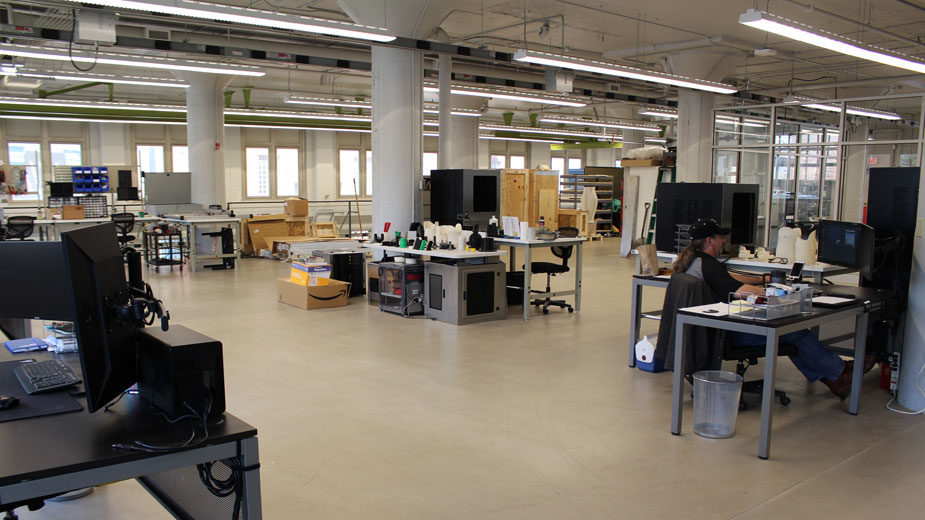
Toward the back of the shop, Juggerbot’s team is assembling the printing carriage that will be installed in one of the new machines. This particular large printer is bound for Penn State University’s main campus, he said.
The company currently has two orders for its F-30, a medium size filament-fed printer, and two orders for its P3-44, its pellet printer.
“What we’re bringing out right now will enable a new age of engineered product,” said Dan Fernback, co-founder and CEO. “We’ve opened the doors for small manufacturing business to larger O.E.M.s [original equipment manufacturers] to focus more on niche applications that otherwise would be unattainable for them.”
Manufacturers that rely on niche tooling to form a lower volume product are ideal customers for 3D printers, Fernback noted. For example, a company that manufactures custom products for a particular model that is produced in low volumes would benefit from purchasing a tool that is 3D printed than one machined from steel.
Traditional tooling could cost a company between $50,000 to $100,000, even if that tool or die is used to manufacture products for a limited run, DiVencenzo said. “The lead times are nine to 16 weeks,” he said.
DiVencenzo then points to a tool on display at the shop that was created by a 3D printer at Oak Ridge Laboratories. This tool in particular is made of heavy-duty thermoplastic and used to produce a component for a GT Cobra car. “This tool was printed in 10 hours,” he said, while delivery times are dramatically improved.
“This tool could be well under $20,000 out the door versus $50,000 to $100,000,” Fernback said, and could be delivered within two weeks to the customer.
DiVencenzo said the company designs its printers in-house, but has secured critical partnerships with local fabricators, machine shops and vendors while working closely with staff at the YBI.
One of the most important is Strangpresse, a YBI portfolio company whose offices are directly across the hall in Tech Block No. 5. Strangpresse manufactures pellet-fed extrusion systems that are able to accommodate very large-scale additive manufacturing programs.
However, Strangpresse has modified its design to fit Juggerbot 3D’s units, said Strangpresse CEO Chuck George.
“We miniaturized the pellet-fed extruder to fit on their 4X4 platform.” George said. “The industry seems to be going more to pellet-fed as opposed to filament-fed extruders.”
Five years ago, the trend was to build bigger 3D printers and extruders, George said.
“Now the push in the market is to build smaller ones that run pellets,” he noted. “We have a design on the drawing board where we think we can make them even smaller.”
Juggerbot 3D also uses local companies such as Charles Mfg. in Warren to fabricate metal used in the printers, while Kiraly Tool & Die, Youngstown, performs any intricate machining work that might be required.
The company’s smallest printer is the ME12 C, a tabletop printer that uses filament to build products for the medical field and other industries, DiVencenzo says. These printers, for example, are used at Mercy Health’s Toldeo campus, he said.
Moreover, DiVencenzo said that Youngstown is today renowned throughout the country as a center for additive manufacturing, helped along by the efforts of the YBI, Youngstown State University and America Makes, a national advanced manufacturing hub that focuses on 3D printing.
To underscore this, DiVencenzo said the company advertised for a design engineer on Indeed.com and received more than 300 applicants. What was unusual was that the posting was available to those living within a 25-mile radius of downtown Youngstown, and a great deal of applicants hailed from California and Texas.
“That means you had to search ‘Youngstown’ and ‘engineer’ to see the post if you were outside a 25-mile radius,” DiVencenzo said. “This has just been amazing.”
Pictured: Juggerbot 3D has doubled its workspace and will start building larger additive manufacturing machines, say cofounders Dan Fernback and Zac DiVencenzo.
Copyright 2024 The Business Journal, Youngstown, Ohio.
